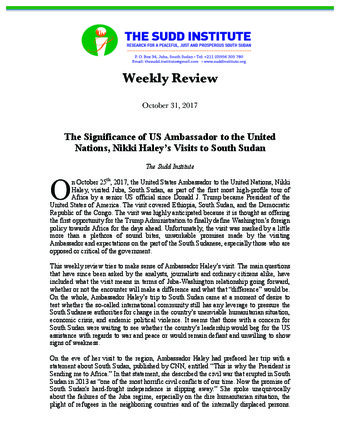The Significance of US Ambassador to the United Nations, Nikki Haley’s Visits to South Sudan
Publication Summary
On October 25th, 2017, the United States Ambassador to the United Nations, Nikki Haley, visited Juba, South Sudan, as part of the first most high-profile tour of Africa by a senior US official since Donald J. Trump became President of the United States of America. The visit covered Ethiopia, South Sudan, and the Democratic Republic of the Congo. The visit was highly anticipated because it is thought as offering the first opportunity for the Trump Administration to finally define Washington’s foreign policy towards Africa for the days ahead. Unfortunately, the visit was marked by a little more than a plethora of sound bites, unworkable promises made by the visiting Ambassador and expectations on the part of the South Sudanese, especially those who are opposed or critical of the government.
This weekly review tries to make sense of Ambassador Haley’s visit. The main questions that have since been asked by the analysts, journalists and ordinary citizens alike, have included what the visit means in terms of Juba-Washington relationship going forward, whether or not the encounter will make a difference and what that “difference” would be. On the whole, Ambassador Haley’s trip to South Sudan came at a moment of desire to test whether the so-called international community still has any leverage to pressure the South Sudanese authorities for change in the country’s unenviable humanitarian situation, economic crisis, and endemic political violence. It seems that those with a concern for South Sudan were waiting to see whether the country’s leadership would beg for the US assistance with regards to war and peace or would remain defiant and unwilling to show signs of weakness.

